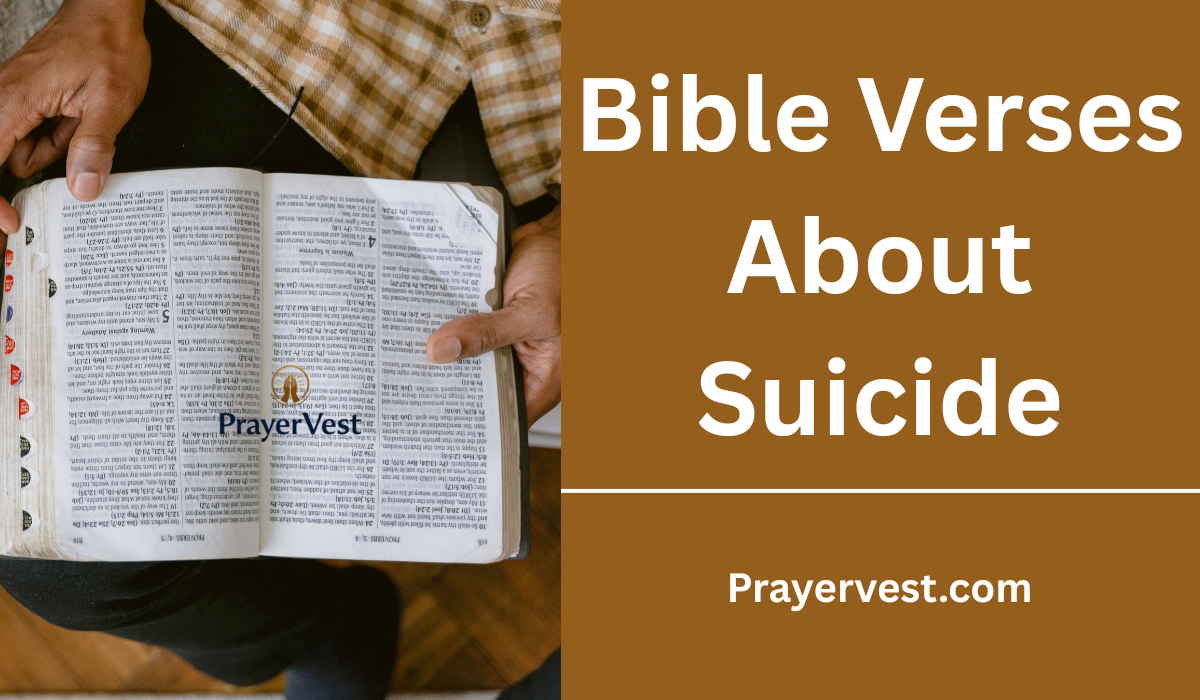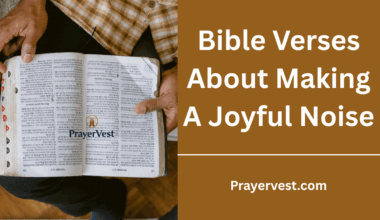One of the most agonizing and challenging subjects to discuss is suicide, for both the person contemplating suicide and the loved ones left behind. The Bible offers hope, consolation, and healing in God’s presence while acknowledging the depth of human sorrow, despair, and brokenness.
Scripture contains timeless truths that speak to hopelessness, despair, and the value of every human life, even if it does not frequently use the word “suicide” explicitly. These passages serve as a reminder that God is aware of our suffering, comprehends our difficulties, and provides for us even in the most dire circumstances.
Stories of people who struggled with extreme grief, dread, or feelings of inadequacy can be found throughout the Bible. People like Job, David, and Elijah poured out their hearts to God, expressing sorrow that anybody who has experienced despair may relate to. God, however, reacted in each instance with kindness, healing, and a fresh mission.
Even when all hope appears lost, the Bible tells us that life is precious because it was made in God’s image and that He offers us comfort, safety, and a future.


These verses from the Bible regarding suicide are intended to help those who are struggling with their inner selves and to provide direction for those who want to be there for them. The love of God, His promises of hope, and His ability to save us from despair are all emphasized in these texts. These Scriptures remind us of the constant reality that God is close to the brokenhearted and provides light in the darkest times of life, whether you’re looking for solace, courage, or the appropriate words to encourage someone else.
40 Most Uplifting Bible Verses About Suicide (2026)
1. Psalm 34:18
“The Lord is close to the brokenhearted and saves those who are crushed in spirit.”
This verse assures anyone drowning in sorrow that God does not keep a cold distance from pain—He draws near. “Brokenhearted” and “crushed in spirit” describe the heaviness that can make life feel unlivable; the psalmist answers that God’s nearness is not abstract but rescuing. His salvation can look like inner strength to breathe again, timely help through friends and counselors, or a renewed awareness of His love. Rather than shaming our weakness, God meets it with compassion and power. When despair whispers that you are alone, this promise contradicts that lie: God is present, attentive, and able to lift what feels impossible to carry.
2. Psalm 42:11
“Why, my soul, are you downcast? Why so disturbed within me? Put your hope in God, for I will yet praise him, my Savior and my God.”
Here, the psalmist models faithful self-talk in the midst of mental and emotional turmoil. He does not deny his anguish; he names it and then redirects it toward hope. “I will yet praise” is the language of future grace—the conviction that today’s darkness is not the end of the story. This verse invites practical rhythms: honest lament, persistent prayer, worship in small steps, and reaching out for help. Hope isn’t a feeling we wait for; it’s a decision to anchor our soul in the character of God until our emotions catch up. The promise is not quick fixes but a steady God who walks with us toward praise.
3. Jeremiah 29:11
“For I know the plans I have for you,” declares the Lord, “plans to prosper you and not to harm you, plans to give you hope and a future.”
Spoken to exiles in a season of loss, this promise reframes suffering through the lens of God’s sovereignty and goodness. “Hope and a future” does not deny present pain; it guarantees that pain will not have the final word. God’s plans include restoration, growth, and purpose—even when our circumstances feel wasted or stalled. For the one contemplating an end, this verse calls for patience with God’s timing and trust in His authorship. We are not abandoned to chaos; our lives are held by a wise Father who weaves good from what looks irredeemable. Waiting with Him is not empty—it is expectant.
4. Isaiah 41:10
“So do not fear, for I am with you; do not be dismayed, for I am your God. I will strengthen you and help you; I will uphold you with my righteous right hand.”
God addresses fear and discouragement with Himself: “I am with you… I am your God.” His presence is the antidote to despair, and His promise is practical—strength, help, and upholding. When you cannot stand, He does the holding. This verse gives language for crisis prayers: “Lord, strengthen me for the next hour; uphold me when I cannot uphold myself.” It also encourages receiving help through the means He provides—community, shepherds, and professionals—as expressions of His upholding hand. The command “do not fear” is not a scold; it is an invitation to lean on a God who will not let go.
5. John 10:10
“The thief comes only to steal and kill and destroy; I have come that they may have life, and have it to the full.”
Jesus exposes the enemy’s agenda—deception, destruction, and despair—and contrasts it with His own mission: abundant life. Suicidal thoughts often speak with the thief’s voice, promising relief through self-destruction; Christ confronts that lie and offers a path to real life. “Life to the full” is not nonstop happiness but a deep, durable vitality found in relationship with Him. It includes forgiveness for the past, purpose in the present, and hope for the future. This verse calls us to reject the destructive script and receive the Shepherd’s care—one day, one step, one conversation at a time.
6. 1 Corinthians 10:13
“No temptation has overtaken you except what is common to mankind. And God is faithful; he will not let you be tempted beyond what you can bear.”
Paul normalizes severe trials—“common to mankind”—and then centers the promise on God’s faithfulness. The verse assures that with every crushing moment, God provides a path to endure and a way out, often through practical helps: reaching out to trusted people, removing immediate dangers, or changing our environment. It does not trivialize suffering; it testifies that God stays engaged in the very moment we feel most overwhelmed. Endurance is not gritting your teeth alone—it is leaning into grace that meets you exactly where you are and opens a door toward safety and life.
7. Matthew 11:28
“Come to me, all you who are weary and burdened, and I will give you rest.”
Jesus invites the exhausted to Himself, not to a program. The rest He offers is soul-deep—a relief from self-condemnation, performance, and relentless pressure. Coming to Him includes prayerful honesty (“Lord, I am at the end”), receiving care from His people, and learning His “easy yoke”—gentle rhythms of grace like Scripture, worship, and wise counsel. This is not passive escapism; it is active trust. When weariness morphs into despair, Christ’s invitation stands open, promising rest that steadies the heart and renews the will to live.
8. Romans 8:38-39
“For I am convinced that neither death nor life, neither angels nor demons… will be able to separate us from the love of God that is in Christ Jesus our Lord.”
Paul piles up extremes to make one point: God’s love is unbreakable. Feelings of abandonment often fuel suicidal thoughts, but this promise anchors our identity in a love that does not ebb with our emotions. Even when we feel numb or unworthy, Christ’s love remains fixed, faithful, and near. This security empowers us to seek help without shame, confess weakness without fear, and keep going when our strength is gone. The greatest truth over your life is not your pain but God’s unlosable love.
9. 2 Corinthians 1:3-4
“Praise be to the God… who comforts us in all our troubles, so that we can comfort those in any trouble with the comfort we ourselves receive from God.”
God’s comfort is both personal and purposeful. He meets us in “all our troubles,” including the silent anguish of suicidal despair, and then transforms our healing into ministry for others. Surviving becomes part of a redemptive story: what once isolated us becomes a bridge of empathy. This does not glamorize suffering; it sanctifies it—God wastes nothing. As we receive His consolation through Scripture, prayer, and community, we are equipped to sit with others in their darkness and point them to the same Father of mercies.
10. Psalm 55:22
“Cast your cares on the Lord and he will sustain you; he will never let the righteous be shaken.”
“Cast” is an active verb—dump the weight, roll the burden onto God. The promise is not that the burden disappears instantly, but that the Lord Himself becomes your sustainer. He stabilizes what feels unstable and guards you when anxiety surges. Practically, this looks like turning worries into specific prayers, journaling fears before God, and inviting trusted people to help carry the load. The assurance “never… be shaken” speaks to ultimate security: in Christ, your life is held steady by a faithful God who can bear what you cannot.
11. Deuteronomy 31:8
“The Lord himself goes before you and will be with you; he will never leave you nor forsake you. Do not be afraid; do not be discouraged.”
This verse highlights the personal commitment of God to His people. He not only goes before us—paving the way through difficulty—but also stays with us, promising never to abandon us. For someone battling despair, the assurance that God will not forsake them is a lifeline. Fear and discouragement often feel overwhelming, but this verse invites us to lean on the unchanging faithfulness of God. Even when feelings scream loneliness, faith rests in the truth that He is already present, guiding and holding us through every shadowed valley.
12. Psalm 147:3
“He heals the brokenhearted and binds up their wounds.”
This verse presents God as a healer, tending to emotional and spiritual pain with the same care a physician gives to physical wounds. It acknowledges the reality of brokenness but emphasizes God’s tender response. His healing is not rushed; it is deliberate and compassionate. For someone struggling with thoughts of suicide, this verse offers the assurance that brokenness is not permanent. God specializes in restoration, carefully binding up wounds that feel too deep to mend. Healing may take time, but His hands are steady and His love constant.
13. Philippians 4:6-7
“Do not be anxious about anything, but in every situation, by prayer and petition, with thanksgiving, present your requests to God. And the peace of God, which transcends all understanding, will guard your hearts and your minds in Christ Jesus.”
Here Paul offers a prescription for anxiety: prayer instead of panic, thanksgiving instead of despair, surrender instead of control. The promise is not that problems disappear but that God’s peace will guard our inner life. This peace defies logic—it steadies the heart even when circumstances remain stormy. For someone overwhelmed with dark thoughts, this verse becomes an invitation to hand over the unmanageable load to God and allow His peace to stand as a guard against destructive thinking.
14. Psalm 23:4
“Even though I walk through the darkest valley, I will fear no evil, for you are with me; your rod and your staff, they comfort me.”
This well-loved verse acknowledges that valleys of deep darkness are part of life’s journey. Yet it also assures us that God does not abandon us there—He walks with us. The rod and staff symbolize His guidance and protection, tools that shepherds use to defend and direct their sheep. For those who feel trapped in despair, this verse is a reminder that valleys are not destinations; they are passages. God’s presence transforms the valley from a place of terror into a place of companionship and comfort.
15. 2 Timothy 1:7
“For the Spirit God gave us does not make us timid, but gives us power, love and self-discipline.”
This verse reminds us that the Holy Spirit equips us with what despair tries to steal—courage, power, love, and soundness of mind. Suicidal thoughts often come with overwhelming fear, confusion, and hopelessness. But God’s Spirit empowers believers to resist those lies and embrace truth. His love counters feelings of worthlessness, His power strengthens our weakness, and His self-discipline brings clarity to chaotic emotions. It’s a call to stand on divine resources rather than our own depleted strength.
16. 1 Peter 5:7
“Cast all your anxiety on him because he cares for you.”
This verse echoes Psalm 55:22 but adds the tender reason why we can release our worries: “because he cares for you.” Anxiety and despair often convince us that no one cares, but God’s Word firmly contradicts that lie. Casting our cares on Him is an act of trust, shifting the weight we cannot carry onto shoulders that never grow weary. His care is personal and unending. For those on the brink of hopelessness, this verse becomes a daily prayer: “Lord, here is my burden; I trust Your care.”
17. Isaiah 40:31
“But those who hope in the Lord will renew their strength. They will soar on wings like eagles; they will run and not grow weary, they will walk and not be faint.”
Isaiah promises supernatural renewal for those who place their hope in God. Strength is not self-generated but divinely supplied. Weariness is replaced with endurance, faintness with perseverance. The imagery of soaring like eagles speaks of rising above despair with God’s lift, not human effort. For someone who feels exhausted by life, this verse offers assurance that God will provide strength for the next step, the next day, and beyond. Hope in Him is the pathway to renewed vitality.
18. Lamentations 3:22-23
“Because of the Lord’s great love we are not consumed, for his compassions never fail. They are new every morning; great is your faithfulness.”
In the midst of a book filled with grief, this declaration shines like a light in darkness. The writer affirms that God’s love prevents total destruction and that His compassion never runs out. Every new day brings fresh mercy. For someone considering an end, this verse reframes tomorrow as a gift of new compassion. God’s faithfulness ensures that no matter how overwhelming today feels, there is always hope waiting in the morning. His mercies invite us to keep going one sunrise at a time.
19. Joshua 1:9
“Have I not commanded you? Be strong and courageous. Do not be afraid; do not be discouraged, for the Lord your God will be with you wherever you go.”
God speaks directly to Joshua’s fear with both command and comfort. Courage here is not the absence of fear but obedience despite it, anchored in the assurance of God’s presence. For those struggling with discouragement, this verse reminds us that we are never asked to endure alone. Wherever we go—even into the darkest emotional places—God goes with us. His companionship fuels strength and courage, making perseverance possible.
20. Proverbs 3:5-6
“Trust in the Lord with all your heart and lean not on your own understanding; in all your ways submit to him, and he will make your paths straight.”
These verses call for complete trust in God, especially when our own understanding fails us. In despair, our reasoning often convinces us that there is no way forward. But Scripture says otherwise: if we submit our ways to God—even the broken, confused, or desperate ways—He promises to direct us. Straight paths do not mean easy paths but guided ones. For someone overwhelmed with suicidal thoughts, this passage is an invitation to release control, trust God’s wisdom, and allow Him to lead toward hope and healing.
21. Psalm 30:5
“Weeping may stay for the night, but rejoicing comes in the morning.”
This verse acknowledges the reality of sorrow—“weeping may stay for the night”—but promises that it will not last forever. Pain is temporary, but joy is certain in God’s timing. For those weighed down by despair, this truth points to the hope that seasons of anguish will give way to renewal. Morning here is not just literal but symbolic of new beginnings that God faithfully brings. Holding onto this verse is like holding onto a rope of hope that pulls us through the night into God’s light.
22. Romans 12:12
“Be joyful in hope, patient in affliction, faithful in prayer.”
Paul offers a practical framework for enduring hardship: hope, patience, and prayer. Joy is rooted in the hope of Christ, not in fleeting circumstances. Patience helps us persevere when relief is delayed. Prayer keeps us connected to the God who sustains. For someone considering giving up, this verse is both a challenge and a comfort—it calls us to endure with God’s help, trusting that the discipline of hope and prayer will carry us through seasons of affliction.
23. Psalm 9:9
“The Lord is a refuge for the oppressed, a stronghold in times of trouble.”
God is described as both a refuge and a stronghold—safe places when life feels dangerous and unstable. For the oppressed, whether by external circumstances or internal battles, this verse declares that God Himself is a place of safety. A stronghold is not easily shaken; it offers stability when everything else feels uncertain. When suicidal despair presses in, this verse calls us to run into the protective presence of God, where He shields and strengthens us.
24. 2 Corinthians 12:9
“My grace is sufficient for you, for my power is made perfect in weakness.”
God’s response to Paul’s struggle is not the removal of weakness but the promise of sufficient grace. This grace is not abstract—it is the empowering presence of God that carries us when we cannot carry ourselves. Suicidal thoughts often arise from overwhelming weakness and inadequacy, but this verse reframes weakness as a place where God’s power is displayed most vividly. It teaches us that we don’t need to be strong enough; we need to depend on the One whose grace never runs dry.
25. Psalm 18:6
“In my distress I called to the Lord; I cried to my God for help. From his temple he heard my voice; my cry came before him, into his ears.”
This verse assures us that God hears every desperate prayer. Distress does not silence Him; it moves Him to act. The image of our cries entering God’s ears communicates intimacy and attentiveness—our pain is not ignored. For those who feel invisible or unheard in their suffering, this verse is a reminder that God listens. Even whispered prayers in the darkest moments reach His throne, and His response is always one of compassion and care.
26. Hebrews 13:5
“Never will I leave you; never will I forsake you.”
This verse is an anchor for those who feel abandoned. Repeated for emphasis, the promise of God’s presence is absolute. Unlike human support, which can fail or fade, God’s presence is constant and unbreakable. Suicidal despair often stems from loneliness and isolation, but this verse counters those feelings with a guarantee: you are never truly alone. God’s nearness is not dependent on our emotions; it is grounded in His character and covenant love.
27. Psalm 121:1-2
“I lift up my eyes to the mountains—where does my help come from? My help comes from the Lord, the Maker of heaven and earth.”
This psalm shifts our gaze from the weight of problems to the greatness of God. The mountains may represent obstacles or strength, but the psalmist declares that real help comes from the Creator of everything. For someone struggling with despair, this verse directs attention upward—to the God who made the universe and is fully capable of providing help. It reassures us that no problem is too great for the One who holds all of creation.
28. Revelation 21:4
“He will wipe every tear from their eyes. There will be no more death or mourning or crying or pain, for the old order of things has passed away.”
This verse paints a picture of ultimate hope—the promise of a future where sorrow and suffering cease. For someone who feels overwhelmed by life’s pain, this passage points beyond the present moment to eternity with God, where despair will be replaced by joy. God Himself is portrayed as personally wiping away tears, showing His tenderness. This future hope can sustain us in the present, reminding us that pain is temporary, but God’s joy is eternal.
29. Psalm 46:1
“God is our refuge and strength, an ever-present help in trouble.”
This verse emphasizes God’s availability—He is not distant but “ever-present” in trouble. Refuge communicates safety, and strength conveys empowerment. Together, they describe God as both shelter and sustainer. For those feeling crushed under the weight of despair, this verse assures us that God’s help is immediate and constant. He is not just a God of the past or future but of the very moment you are in.
30. Romans 15:13
“May the God of hope fill you with all joy and peace as you trust in him, so that you may overflow with hope by the power of the Holy Spirit.”
Paul describes God as “the God of hope,” reminding us that hope itself is His gift. This verse offers a prayer for overflowing hope, joy, and peace—qualities that despair seeks to steal. The key is trust in Him, which opens the door for the Holy Spirit to pour His power into our hearts. For someone facing suicidal thoughts, this verse reassures that hope is not something we must manufacture; it is something God fills us with as we turn to Him in trust.
31. John 14:27
“Peace I leave with you; my peace I give you. I do not give to you as the world gives. Do not let your hearts be troubled and do not be afraid.”
Jesus offers His peace as a lasting gift, different from temporary comfort the world provides. His peace settles anxious hearts and quiets troubled minds. In moments of deep despair, this verse reminds us that fear and turmoil are not the end of the story—Christ’s peace is available right now. It empowers us to face tomorrow with courage, knowing that His presence provides a calm that no storm can remove.
32. Isaiah 43:2
“When you pass through the waters, I will be with you; and when you pass through the rivers, they will not sweep over you.”
This verse paints a vivid picture of life’s overwhelming trials—floodwaters and rivers that threaten to consume us. Yet God promises His presence and protection. The waters may rise, but they will not drown us. This verse is a lifeline for those facing suicidal despair, assuring that God’s presence is stronger than the flood of hopelessness. It is not a promise of escape from trial, but of survival through it.
33. Matthew 28:20
“And surely I am with you always, to the very end of the age.”
Jesus closes His Great Commission with a promise of enduring presence. He does not send His followers into life’s struggles alone. “Always” means constant companionship—even in silent suffering, grief, or suicidal thoughts. For those who feel abandoned, this verse anchors the heart in the assurance that Christ’s presence is unbreakable. His nearness is not seasonal; it is eternal.
34. Psalm 3:3
“But you, Lord, are a shield around me, my glory, the One who lifts my head high.”
David proclaims God as his protector and encourager. A shield speaks of defense against attack, while the lifting of the head suggests restoration of dignity and hope. In despair, heads hang low in shame and hopelessness. But God promises to lift us, restoring our perspective and worth. For those crushed under suicidal thoughts, this verse declares that God Himself surrounds and upholds His children.
35. Nahum 1:7
“The Lord is good, a refuge in times of trouble. He cares for those who trust in him.”
This verse reassures us of God’s goodness and His role as a safe place. In times of trouble, His care is not distant—it is personal and present. Trust becomes the key to experiencing His refuge. For those overwhelmed by despair, this verse reminds us that God’s goodness does not change with circumstances. Even in the darkest moments, He remains a safe refuge and a loving caretaker.
36. Philippians 1:6
“He who began a good work in you will carry it on to completion until the day of Christ Jesus.”
Paul assures believers that God finishes what He starts. Life may feel incomplete or broken, but God’s work in us is ongoing. Despair tempts us to believe our story is over, yet this verse insists the opposite: God Himself is writing the final chapter, and it will be good. For those considering giving up, this truth offers assurance that God has not finished His beautiful work in you.
37. Psalm 139:13–14
“For you created my inmost being; you knit me together in my mother’s womb. I praise you because I am fearfully and wonderfully made.”
These verses affirm the sacred value of every human life. God personally formed each of us, making our lives intentional and precious. Suicidal thoughts often stem from feelings of worthlessness, but this passage counters with the truth of divine design. We are not accidents; we are masterpieces of God’s hand. Recognizing our worth in Him can help restore a sense of identity and purpose.
38. Zephaniah 3:17
“The Lord your God is with you, the Mighty Warrior who saves. He will take great delight in you; in his love he will no longer rebuke you, but will rejoice over you with singing.”
This verse presents God as both a mighty warrior and a tender Father. He fights for us and delights in us. The imagery of God singing over His children communicates extraordinary love and joy. For someone struggling with despair, this verse proclaims worth and belovedness in God’s eyes. We are not just tolerated—we are celebrated.
39. 2 Thessalonians 3:3
“But the Lord is faithful, and he will strengthen you and protect you from the evil one.”
Paul reassures the church that God’s faithfulness includes strength and protection. The evil one seeks to destroy lives with lies and despair, but God’s power stands as a shield. For those struggling with suicidal thoughts, this verse declares that God Himself fights against the forces that seek to pull us down. His faithfulness ensures that we are never left unguarded or without strength.
40. Psalm 16:11
“You make known to me the path of life; you will fill me with joy in your presence, with eternal pleasures at your right hand.”
The psalmist celebrates God as the source of life and joy. He directs us on the path of life, not death, and offers fullness of joy in His presence. For someone overwhelmed by hopelessness, this verse redirects focus from despair to the abundant life and eternal pleasures God promises. Life with Him is filled with meaning, joy, and eternal hope that outlasts every present pain.
Conclusion
When we consider these suicide-related Bible scriptures, we are reminded that God’s love never forsakes us, even in the most hopeless circumstances. He is near to the brokenhearted and saves those who are crushed in spirit, according to the Scriptures. Even though life’s challenges sometimes seem insurmountable, God encourages us to confide in Him about our suffering, uncertainties, and difficulties. He provides unfathomable serenity, consolation during sorrow, and the knowledge that every existence has infinite value in His eyes.
These verses are a reminder to anyone who is experiencing suicidal thoughts that there is hope and support available. Every life has a purpose and a design, and God gives us the fortitude to persevere through the most trying times. As Christians, we are obligated to show love, compassion, and support to others in need in addition to finding solace in God’s Word. Scripture ultimately reminds us that God’s light shines in the dark and that no darkness is too deep for His healing presence.






